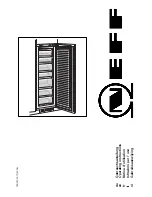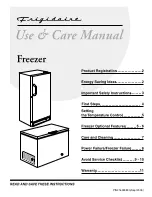
6
GB
For the preparation of food to be frozen, please con-
sult a specialized manual.
Food that has be thawed, even partially, must not be re-
frozen: you must cook it in order to consume it (within 24
hours) or to freeze it once again.
When freezing fresh foods, remember that they should not
touch other previously frozen or deep frozen foods. Place
the food that you wish to freeze in the top compartment
(
O
) where the temperature will fall below -18°C, which is
ideal for freezing food properly. Remember that proper con-
servation depends on the speed of freezing.
The maximum amount of food you can freeze per day is
indicated on the data plate situated inside the refrigerator
compartment.
The first time, or after the freezer has been inactive, you can
only freeze food after having let the appliance function at
maximum.
Press the freezing button “
Super Freeze
” (
F
), yellow lamp
(
E
) lit, and insert the food to be frozen. After 24 hours, or
once the optimum temperatures have been reached, the
rapid freezing function will switch itself off automatically,
yellow lamp (
E
) off.
During the freezing process, avoid opening the door of the
freezer.
In order to freeze and then thaw foods optimally, it is rec-
ommended that you divide food into small portions so that
they freeze quickly and uniformly. The packages should be
clearly marked with the content and the date they were
frozen.
Do not open the freezer door in the event of a power failure
or malfunction. This precaution will slow the rise in tem-
perature within the compartment. If the door is not opened,
frozen and fast-frozen foods will remain in their current state
for approximately 9-14 hours.
Do not place full bottles in the freezer: they could easily
burst because all liquids increase in volume when they freeze.
WARNING: to avoid blocking the air circulation inside
the refrigerator, it is advisable not to obstruct the
ventilation holes with food or containers.
How to use the freezer compartment...
Ice tray
This new concept of ice tray is an exclusive Merloni patent.
The fact that they are situated on the inner door of the
freezer compartment ensures greater ergonomics and
cleanliness: the ice no longer comes into contact with the
food placed inside the freezer compartment; furthermore,
the dripping of the water during filling is avoided (a lid to
cover up the hole after filling with water is also provided).
Fig. 5
To remove the ice trays from
their housings, push the tray
upwards and then pull it out
(fig. 4). To put the tray back
in place, insert the top part
into the special housing and,
once in a vertical position,
just let it drop into place.
Instructions for use
(Fig. 5)
Fill up the tray with water via the special hole up to the level
indicated (MAX WATER LEVEL), taking care not to exceed it:
inserting more water than is necessary will lead to the
formation of ice which could obstruct the exit of the ice
cubes.
If you have used an excessive amount of water, you will
have to wait until the ice has melted, empty out the tray
and re-fill it with water.
Once you have filled the ice tray up with water through the
hole indicated, turn it by 90 °. Thanks to the connected
compartments, the water fills up the special shapes, after
which you can cover the hole up with the special cap and
place the ice tray in the inner door of the freezer
compartment.
Once the ice has formed, all you need to do is to knock the
tray against a hard surface so that the ice cubes come away
from their housing and come out of the same hole used to
MAX
WATER LEVEL
MAX
WATER LEVEL
Fig. 4


































